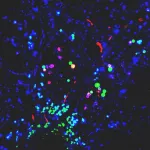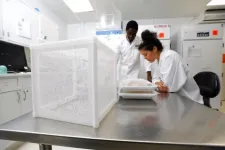(Press-News.org) Rochester Institute of Technology’s Emiliano Brini, assistant professor in the School of Chemistry and Materials Science, has received an award from the National Institutes of Health (NIH) to support his research on building the next generation of drugs.
Brini and his team of students will develop computational tools that can predict the strength of the interaction between two proteins and how drugs will modify this interaction. Physics-based methodologies will quickly and accurately provide such predictions.
Designing a new class of drugs that target the protein-protein interactions at the core of the cell’s ability to function will allow for more effective treatments for cancer, genetic diseases, viral infections, and bacterial infections.
“We need to move toward a new class of drugs,” said Brini. “The drugs we have work, but they can work better. Usually drugs interact with a single protein, but almost every protein interacts with another protein at some point. If we can change this interaction, we have much more control on what the protein does and what the cell does.”
Using physics-based computational models in drug design is a relatively new focus and has allowed research and development to move forward more quickly. Targeting protein-protein interactions is challenging based on numerous factors but has resulted in the discovery of more effective treatments.
“It’s a very complicated problem,” added Brini. “It is a problem that machine learning and artificial intelligence are not there yet to solve, so we need other tools. This is where we come in with physics.”
Brini has been awarded $185,000 from the NIH with more funding anticipated as his work continues over the next few years.
END
RIT researcher receives NIH funding to help design better drugs
Emiliano Brini to study protein-protein interactions with physics-based computational modeling
2023-11-17
ELSE PRESS RELEASES FROM THIS DATE:
UChicago’s Pritzker School of Molecular Engineering Faculty boost vaccines and immunotherapies with machine learning to drive more effective treatments
2023-11-17
Small molecules called immunomodulators can help create more effective vaccines and stronger immunotherapies to treat cancer.
But finding the molecules that instigate the right immune response is difficult —the number of drug-like small molecules has been estimated to be 1060, much higher than the number of stars in the visible universe.
In a potential first for the field of vaccine design, machine learning guided the discovery of new immune pathway-enhancing molecules and found one particular small molecule that could outperform the best immunomodulators on the market. The ...
Seven ORNL scientists among world’s top 1% most-cited researchers
2023-11-17
Seven scientists from the Department of Energy’s Oak Ridge National Laboratory have been named among the world’s most influential researchers on the 2023 Highly Cited Researchers list, produced by Clarivate, a data analytics firm that specializes in scientific and academic research.
"These scientists have delivered significant impact for the scientific community and nation," said ORNL Director Stephen Streiffer. "This honor highlights their commitment, hard work and leadership in their respective fields.”
The ORNL researchers named to the list are:
Miaofang Chi, Center for Nanophase Materials Sciences
David A. Cullen, Center for Nanophase Materials ...
Lung cancer cells’ ‘memories’ suggest new strategy for improving treatment
2023-11-17
A new understanding of lung cancer cells’ “memories” suggests a new strategy for improving treatment, Memorial Sloan Kettering Cancer Center (MSK) researchers have found.
Research from the lab of cancer biologist Tuomas Tammela, MD, PhD shows that some lung cancer cells retain a “memory” of the healthy cell where they came from — one that might be exploited to make an emerging type of lung cancer treatment called KRAS inhibition more effective.
The study looked specifically at lung adenocarcinoma, a type of non-small ...
Idai vs. Impalas: New study shows in real-time what helps mammals survive a natural disaster
2023-11-17
When Cyclone Idai swept through Mozambique’s Gorongosa National Park in May 2019, one of nature‘s deadliest forces encountered one of the most technologically sophisticated wildlife parks on the planet. Princeton researchers and colleagues from around the world documented the effects using trail cameras and animal-tracking devices that had been in use before the storm.
Thanks to the extensive network of cameras, GPS collars and other instruments, park staff and ...
Nanoplastics promote conditions for Parkinson’s across various lab models
2023-11-17
DURHAM, N.C. – Nanoplastics interact with a particular protein that is naturally found in the brain, creating changes linked to Parkinson’s disease and some types of dementia.
In a Duke-led study appearing Nov. 17 in Science Advances, the researchers report that the findings create a foundation for a new area of investigation, fueled by the timely impact of environmental factors on human biology.
“Parkinson’s disease has been called the fastest growing neurological disorder in the world,” said principal investigator, Andrew West, Ph.D., professor in the Department of Pharmacology and Cancer Biology at ...
New research suggests plants might be able to absorb more CO2 from human activities than previously expected
2023-11-17
New research published today in leading international journal Science Advances paints an uncharacteristically upbeat picture for the planet. This is because more realistic ecological modelling suggests the world’s plants may be able to take up more atmospheric CO2 from human activities than previously predicted.
Despite this headline finding, the environmental scientists behind the research are quick to underline that this should in no way be taken to mean the world’s governments can take their foot off the brake in their obligations to reduce carbon ...
In the fight against malaria-carrying mosquitoes, just add soap
2023-11-17
EL PASO, Texas (Nov. 17, 2023) – Could the solution to the decades-long battle against malaria be as simple as soap? In a new study published in PLOS Neglected Tropical Diseases, scientists at The University of Texas at El Paso have made a compelling case for it.
The team has found that adding small quantities of liquid soap to some classes of pesticides can boost their potency by more than ten-fold.
The discovery is promising news as malaria-carrying mosquitoes display ...
Deep dive on sea level rise: new modelling gives better predictions on Antarctic ice sheet melt
2023-11-17
Using historical records from around Australia, an international team of researchers have put forward the most accurate prediction to date of past Antarctic ice sheet melt, providing a more realistic forecast of future sea level rise.
The Antarctic ice sheet is the largest block of ice on earth, containing over 30 million cubic kilometers of water.
Hence, its melting could have a devasting impact on future sea levels. To find out just how big that impact might be, the research team, including Dr Mark Hoggard from The Australian National University, turned to the past.
“If ...
Crime-free housing policies increase evictions among minorities, but do not cut crime
2023-11-17
Policies that encourage landlords to evict tenants who have involvement with the criminal justice system do not appear to reduce crime, while increasing evictions among Black residents and people with lower incomes, according to a new RAND Corporation report.
Studying “crime-free housing policies” adopted by cities in California over a decade-long period, researchers found no meaningful statistical evidence that the policies reduce crime.
The study also found that crime-free housing policies significantly increased ...
Consumption of antibiotics in the community back to pre-pandemic levels in the European Union and European Economic Area
2023-11-17
This year’s European Antibiotic Awareness Day (EAAD) focuses on the targets outlined in the 2023 Council Recommendation to step up efforts in the European Union (EU) against antimicrobial resistance in a One Health approach. [1] Those recommendations formulate the 2023 goal to reduce total antibiotic consumption (community and hospital sectors combined) by 20%, using consumption data from 2019 as baseline.
Consumption of antibiotics in the community accounts for around 90% of the total use. This means, that a substantial and consistent decline in the use of antibiotics in this sector will be key on the way towards reaching ...
LAST 30 PRESS RELEASES:
Americans don’t just fear driverless cars will crash — they fear mass job losses
Mayo Clinic researchers find combination therapy reduces effects of ‘zombie cells’ in diabetic kidney disease
Preventing breast cancer resistance to CDK4/6 inhibitors using genomic findings
Carbon nanotube fiber ‘textile’ heaters could help industry electrify high-temperature gas heating
Improving your biological age gap is associated with better brain health
Learning makes brain cells work together, not apart
Engineers improve infrared devices using century-old materials
Physicists mathematically create the first ‘ideal glass’
Microbe exposure may not protect against developing allergic disease
Forest damage in Europe to rise by around 20% by 2100 even if warming is limited to 2°C
Rapid population growth helped koala’s recovery from severe genetic bottleneck
CAR-expressing astrocytes target and clear amyloid-β in mouse model of Alzheimer’s disease
Unique Rubisco subunit boosts carbon assimilation in land plants
Climate change will drive increasing forest disturbances across Europe throughout the next century
Enhanced brain cells clear away dementia-related proteins
This odd little plant could help turbocharge crop yields
Flipped chromosomal segments drive natural selection
Whole-genome study of koalas transforms how we understand genetic risk in endangered species
Worcester Polytechnic Institute identifies new tool for predicting Alzheimer’s disease
HSS studies highlight advantages of osseointegration for people with an amputation
Buck Institute launches Healthspan Horizons to turn long-term health data into Actionable healthspan insights
University of Ottawa Heart Institute, the University of Ottawa and McGill University launch ARCHIMEDES to advance health research in Canada
The world’s largest brain research prize awarded for groundbreaking discoveries on how we sense touch and pain
Magnetofluids help to overcome challenges in left atrial appendage occlusion
Brain-clearing cells offer clues to slowing Alzheimer’s disease progression
mRNA therapy restores fertility in genetically infertile mice
Cloaked stem cells evade immune rejection in mice, pointing to a potential universal donor cell line
Growth in telemedicine has not improved mental health care access in rural areas, study finds
Pitt scientists engineer “living eye drop” to support corneal healing
Outcomes of older adults with advanced cancer who prefer quality of life vs prolonging survival
[Press-News.org] RIT researcher receives NIH funding to help design better drugsEmiliano Brini to study protein-protein interactions with physics-based computational modeling






